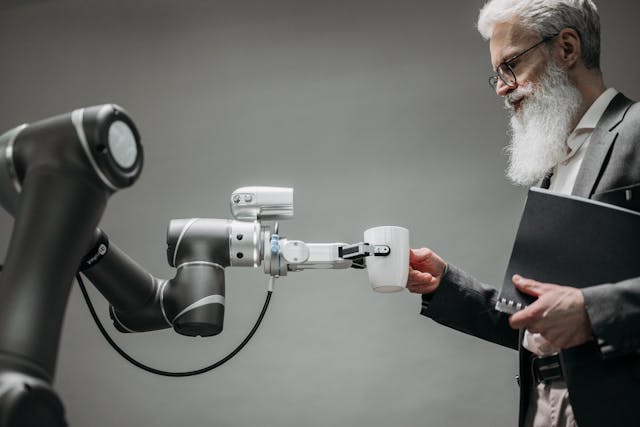One thing that is not new to the business world anymore is artificial intelligence. It’s a buzzword phrase, or well, it used to be, and it’s over now. Because in the part of the curve we’re in, people are not talking about the hype that it brings as much as they used to.
We already know that artificial intelligence is useful for businesses, and we already know that it can be detrimental to others. AI is becoming the kind of technology that’s almost expected these days, with everything being automated and everything from an interview process to reading a menu in a restaurant being AI optimized. You use it, you benefit from it, but you won’t think about it very much except when you’re using it in your business.Whether you are using it to start reshaping conversational UI, or you are using it for automation, AI is going to be embedded in the technology you use no matter what. The best technologies are like that. They vanish into the background and become another tool in the toolbox.
The thing that makes AI especially interesting in the business world though, is the fact it’s so versatile. It’s not just one thing, it’s a way of solving multiple problems at the same time that were once unsolvable. It’s become the ultimate multi tool, and it’s capable of fitting itself to the unique challenge of any industry. Understanding how AI can be used in business will help you to go a long way in what you are doing. So let’s take a look at some of the most promising and up and coming applications of AI in business right now.
- Customer service. We already talked about how it can be used to reshape conversational UI, and AI has become very good at automating and customer service. Credit card giants are using chatbots online to offer quick and relevant answers to user queries at all times of the day and the night. AI is also providing personalized recommendations for insight into account balances with the big banks.With the help of AI, transaction histories can be reviewed properly and this is a shift that is not going anywhere anytime soon. It’s about giving customers what they need more quickly and consistently, and it’s not just the big banks that are doing it. Plenty of companies are leaning into how chatbots are helping with answering queries that are not often found in the content on the website. The queries can be tailored and because of an instant answer service they will be able to get the answers they need and feel satisfied with the service that is being offered by your business.
- Personalisation in marketing. The Holy Grail of marketing has always and will always be personalisation. People don’t want to feel like they’re being given random emails in their inbox, they want to feel like those emails are direct to them and personalized for them. With artificial intelligence at the forefront, personalized marketing is made possible at a larger scale. Amazon and Netflix have really set the standard here, but you don’t have to be a massive tech giant to be able to benefit from the AI algorithms. Algorithms analyze user behavior, and they’re able to help predict what customers could want. So when you’re scrolling on Amazon and you’ve searched for something to do with a Christmas gift. You’re going to get the same suggestions popping up because Amazon’s algorithm has analyzed what you’re shopping for and feels like you need more of it. This can be very helpful if you’re looking for alternative options, but not too helpful if you’ve googled the toilet seat lid and now you’re being given 15 different suggestions. Personalisation in marketing can make a big difference to the way that customers see you, and it can help people to stay on your email lists rather than unsubscribe.
- Predictive analytics. If there’s one thing that companies have always tried to do, it’s predict what comes next so that they can be ahead of the curve. There are plenty of companies that use AI based predictive models to spot any unusual activity or help prevent fraud. Predictive analytics can also help with marketing and analyzing historical data. This would help to spot patterns that may be otherwise invisible to humans. Artificial intelligence can tell a company not just what will happen, but what to do about it and when to do it. Anticipatory responses are important here, and predictive analytics can really help. It can be done by – and it’s often overseen by – humans, but AI can dive deeply into the data.
- Recruitment. Hiring has changed in recent years, with job boards being able to scan CVS for keywords and put them at the top of the recruiters inbox. Recruitment companies are using AI software to sift through the myriad of CVS they may receive every single day, and while this may be a negative for candidates, it’s not a negative for businesses. The unfortunate way it’s being used here is that AI is pushing. The idea that keywords are relevant, but if candidates don’t realize this is happening, that’s where problems arise. For a recruiter, however, it’s an excellent way to be able to narrow down who to interview without having to go through hundreds of CVS in a day. Companies are using AI to make hiring more objective by analyzing language patterns through interviews and ensure that biases don’t creep in. When a team is in place, AI can help with support with performance evaluations and personalized training suggestions. Supply chain help. The world of logistics has embraced AI fully, and that’s because of their many moving parts. It’s always been very hard for humans to make supply chains efficient, so employing generative AI for documentation, automation and optimizing internal processes is a great idea. AI optimizes routes for truckers, predicts disruptions on the roads, and even adjusts procurement strategies where necessary. With AI driven supply chains, companies are able to find themselves in a more resilient position with tighter and more efficient and more streamlined options. This makes businesses more competitive because they can cut costs, reduce waste and not have to worry about human error.
- Forecasting sales. Sales forecasting has always been more of an art, but AI is changing that with artificial intelligence. Forecasting is becoming more of a science because it can analyze past performance alongside market conditions. It can also take a look at the general customer behaviors to predict future sale patterns and do this more accurately than humans ever could.By knowing what comes next, companies can then allocate their resources better, from budgeting to staffing to sales.
- Detecting fraud. There was once a time it was very difficult to detect fraud in a business, but with AI this has become much easier. Tightening up security is so important for every business and if it can be done with fraud detection then why not? It may be one of the most important but least visible uses, especially for financial institutions. There are always fraud teams working in the financial business, but AI can find anomalies in data that humans cannot spot. These models always watch out for things that are unexpected and that makes transactions safer without inconveniencing their customers.
- Quality control in the manufacturing process. Hiring teams of human beings to execute quality control has always been the way to do it. However, there’s one thing that can be beaten, and that’s human error. Factories are deploying AI solutions to make sure that their products meet quality standards, but they’re also making sure that there’s no issues in the quality process. This typically involves using computer vision to spot any defects, but it’s not just about catching any mistakes. AI also prevents them by finding patterns in data that predict when something is about to go wrong, so that can be anticipated before it actually goes wrong and loses the business money.
- Virtual assistance. Not just for consumers, virtual assistants are being used by companies internally. These are tools that help employees to find information, schedule meetings, and even track their projects. Assistance virtually can save time and ensure employees spend more of their day on actual work and not the logistics of the work itself. With AI in place, everything can be streamlined in different programs and company employees will be able to follow it more.
- AI in R&D. Research and development has been the one area that transformative use of AI has occurred. There are big companies out there that are using generative AI to streamline their research and allow financial advisors to offer more insightful advice. AI doesn’t just analyze data, but it can generate a hypothesis. By modeling outcomes before the experiments actually take place AI speeds up innovation.
Now that you know more about how AI can be used in business, you can then use it for yourself.


